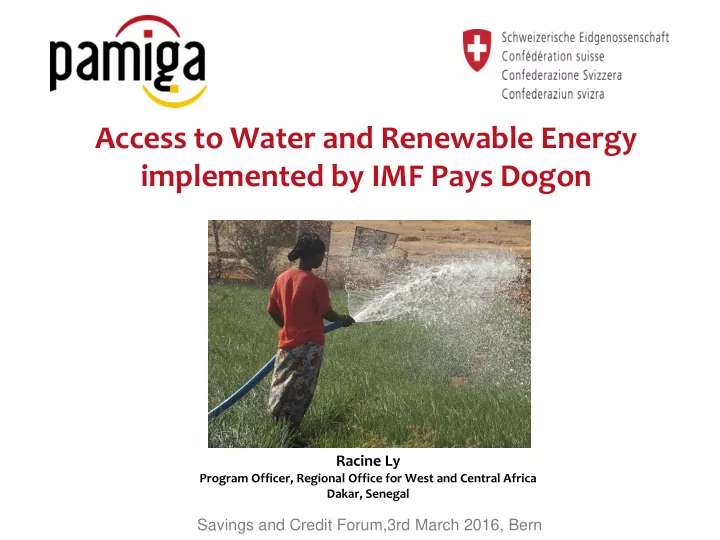

Access to Water and Renewable Energy implemented by IMF Pays Dogon Racine Ly Program Officer, Regional Office for West and Central Africa Dakar, Senegal Savings and Credit Forum,3rd March 2016, Bern
PAMIGA’s “Water & Microfinance Initiative” ▪ “ Water and Microfinance Initiative ”: program implemented by PAMIGA since 2012 through the financial support of the Swiss Agency for Development & Cooperation (SDC) . ▪ Four countries in West Africa : Senegal, Burkina Faso, Benin and Mali. ▪ Started in Senegal in 2012 (UIMCEC) and in Mali in 2015 (CVECA-Pays Dogon) . ▪ 508 loans disbursed in the 2 countries, for a total amount of EUR 606,315 , benefitting to more than 2500 individuals (household members). Senegal: U-IMCEC October 2012 Benin: RENACA Benin: ACFB 10/29/2012 11/3/2014 2012 2013 2014 2015 2016 July 2015 1/31/2012 Mali: CVECA- Program Kick-off Pays Dogon 10/22/2012 Burkina-Faso: APFI 2
About Mali and “Pays Dogon” Mali : eighth-largest country in Africa (and second in West Africa), with an area of just over 1,240,000 square kilometers. Population : 15 million. Agriculture : 80% of total workforce. Pays Dogon : part of the Mopti region (750km north of Bamako). Four administrative circles: Bankass, Bandiagara, Douentza and Koro. Highest potential for horticulture production in the country. 3
The Network of CVECAs of Pays Dogon, Mali Created 30 years ago (1986). License to operate obtained in 1997 from the GoM. Partner MFI of PAMIGA since 2006 (founding member). HQ in Koro with 13 full-time staff. 27 branches. More than 23,000 clients (members). Mission : Provide financial and non-financial services to rural populations of “Pays Dogon”, and help them improve their livelihoods through the development of their income- generating activities. 4
About U-IMCEC Senegal Year Established: 2005 One of the top-ranked microfinance institutions in Senegal (covering 12 out of 14 regions in the country). A member of the PAMIGA network since 2009. Mission : Contribute to improving the incomes and livelihoods of rural households through the provision of adapted financial services, targeting women and youth in rural areas. 120,517 clients (36% women) 20,305 active clients (41% women) Staff size: 179 (149 full-time and 30 short-term) Access to irrigation initiative: 3 regions (Thiès, the Niayes Strip and Saint-Louis / River Valley). 5
Promoting Access to Productive Water NEEDS IDENTIFIED ▪ 87% of clients rely on horticulture as their main source of income. ▪ 63% are smallholders with land size between 0.25ha and 0.5ha. ▪ 82% have challenges accessing productive water. ▪ 97% of clients rely on manual irrigation techniques, and need modern equipment. OBJECTIVE OF THE INITIATIVE ▪ Improve the access of rural populations (smallholder farmers, in particular) to productive water, to enable them to: Expand their irrigated perimeters / acreages; Diversify their production with high added value crops; Increase their financial income; Improve their livelihoods; Better manage available water resources. 6
Role of PAMIGA and PFSA Credit Facility from PAMIGA Finance SA ▪ Framework credit agreements UIMCEC Senegal: EUR 600K signed in October 2012 and fully repaid to PFSA in June 2015. New credit line of EUR 900K signed in September 2015 for a total duration of 4 years . Pays Dogon, Mali: EUR 360K signed in July 2015, for a total duration of 6 years, and 2-year credit lines. Technical Assistance from PAMIGA Association ▪ Feasibility study and needs assessment. ▪ Baseline study on the potential environmental impacts of micro-irrigation projects. ▪ Financial product development (definition of product features, procedures and risk management tools). ▪ Staff orientation and training: ToT sessions and grooming/mentoring of one “Irrigation Champion” per country/MFI. ▪ Technology selection and partnership building: screening and selection of local irrigation technologies and providers. ▪ Follow-up and monitoring of project implementation. 7
Results achieved Diversification of product offering: introduction of a new financial product adapted to the needs of smallholders. 508 loans disbursed in the 2 countries, benefitting to more than 2500 individuals (household members). About 63% = women . 52 staff trained on product features, procedures and the thematic of access to irrigation through microfinance. Increase in acreages cultivated, by around +50- 60% (estimates from Pays Dogon). Increased volume of horticultural production . Training of local village technicians on repair and maintenance of equipment; training of end-users on equipment features (Pays Dogon). 8
Lessons Learnt Key success / sustainability factors Design/offer financial products that are adapted to the needs of clients (demand- driven). Thorough selection of sound technologies and providers. Reliability of irrigation equipment purchased ( 0 technical failure registered). Full integration and ownership by the MFI of the innovation, the procedures and processes, through training and skills transfer/building. End-user training on technology features. Good loan repayment 9
Recommendations Carry out pilot phase evaluation (Mali): document learnings, take corrective measures if required and define roll-out plan. Develop and strengthen a network of skilled village technicians for installation, maintenance/repair and after sales services (Mali and Senegal). Strengthen the MFI’s skills in financial management, risk analysis, portfolio management (Mali). Fine-tune current marketing strategy to reach out to more clients in intervention areas (Senegal and Mali). Carry out environmental impact assessment and disseminate learnings and best practices (Mali). 10
Thank You! Savings and Credit Forum Inclusive finance promoting high impact solutions for low income populations in rural communities The PAMIGA model for improved access to water and energy Thursday 3 rd March 2016 SDC Freiburgstrasse 130, Bern 11
Recommend
More recommend